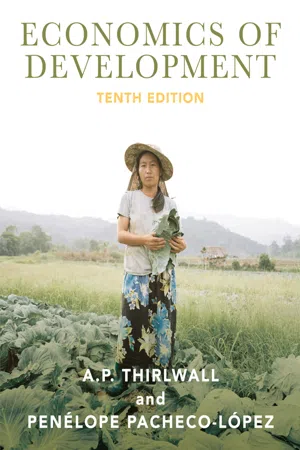
- 680 pages
- English
- ePUB (mobile friendly)
- Available on iOS & Android
About this book
This classic, bestselling textbook provides a comprehensive introduction to the field of development economics. The 10th edition of Tony Thirlwall's book, now co-written with Penélope Pacheco-López, provides a clear, comprehensive and rigorous introduction to the theory of development economics and the experience of developing countries. Balancing a historic approach with current data and references, it provides a wide-ranging analysis of the subject. This all-inclusive methodology succeeds at representing different schools of thought with a balance of micro and macro topics. An ideal textbook for undergraduate students of economics and other social sciences, it is also suitable for upper undergraduate and master's level modules on development economics as an option on a non-economics degree. New to this Edition:
- A brand new chapter on human capital: education, nutrition, health, and therole of women in development
- New material on the Sustainable Development Goals, the measurementof poverty, and the multidimensional poverty index
- Discussion of randomized control trials
- The role of structural change in economic development
- New IMF lending facilities Accompanying online resources for this title can be found at bloomsburyonlineresources.com/economics-of-development-10e. These resources are designed to support teaching and learning when using this textbook and are available at no extra cost.
Frequently asked questions
- Essential is ideal for learners and professionals who enjoy exploring a wide range of subjects. Access the Essential Library with 800,000+ trusted titles and best-sellers across business, personal growth, and the humanities. Includes unlimited reading time and Standard Read Aloud voice.
- Complete: Perfect for advanced learners and researchers needing full, unrestricted access. Unlock 1.4M+ books across hundreds of subjects, including academic and specialized titles. The Complete Plan also includes advanced features like Premium Read Aloud and Research Assistant.
Please note we cannot support devices running on iOS 13 and Android 7 or earlier. Learn more about using the app.
Information
| I |
| DEVELOPMENT AND UNDERDEVELOPMENT |
| 1 |
| THE STUDY OF ECONOMIC DEVELOPMENT • Introduction • Development economics as a subject • Academic interest in development • The new empirical development economics • A new international economic order • Sustainable Development Goals • Globalization and interdependence of the world economy • The meaning of development and the challenge of development economics • The perpetuation of underdevelopment • Summary • Discussion questions • Websites |
Introduction
Development economics as a subject
Table of contents
- Cover
- Series Page
- Titelpagina
- Copyright
- Dedication
- A Personal Message from the Authors
- Brief Contents
- Contents
- List of Figures
- List of Tables
- List of Case Examples
- Preface
- Universal Declaration of Human Rights
- Acknowledgements
- Part I Development and underdevelopment
- Part II Factors in the development process
- Part III The perpetuation of underdevelopment
- Part IV Financing economic development
- Part V International trade, the balance of payments and development
- References and Further Reading
- Name Index
- Subject Index